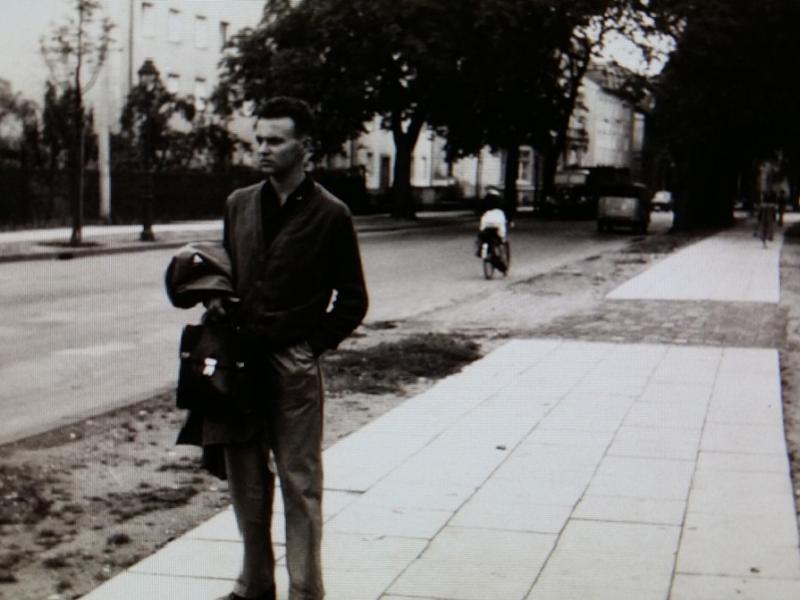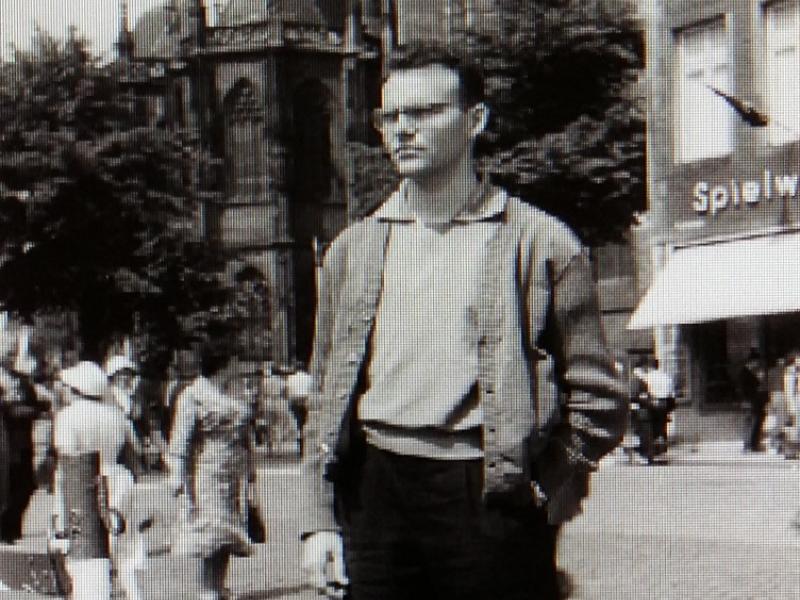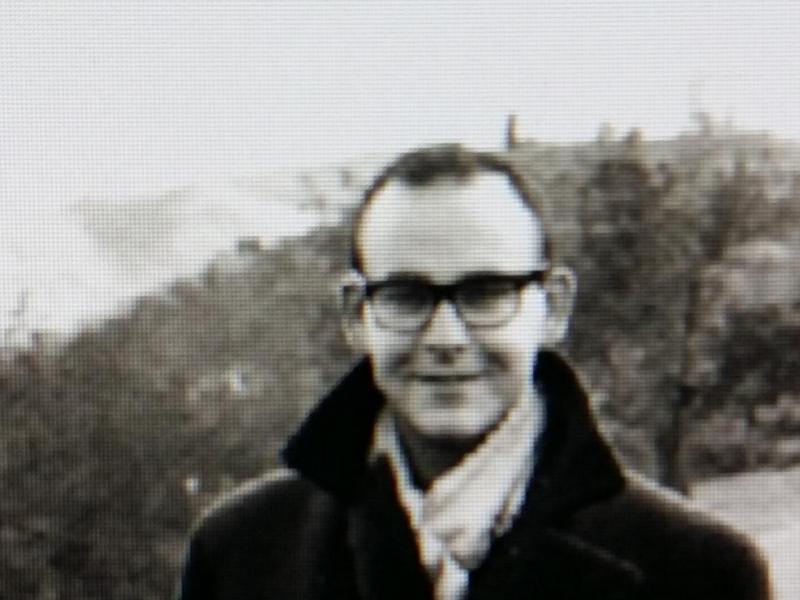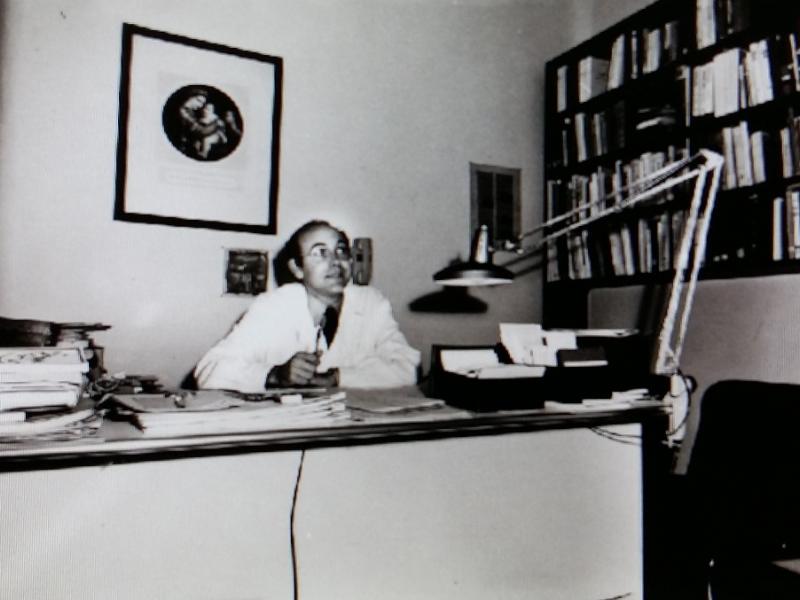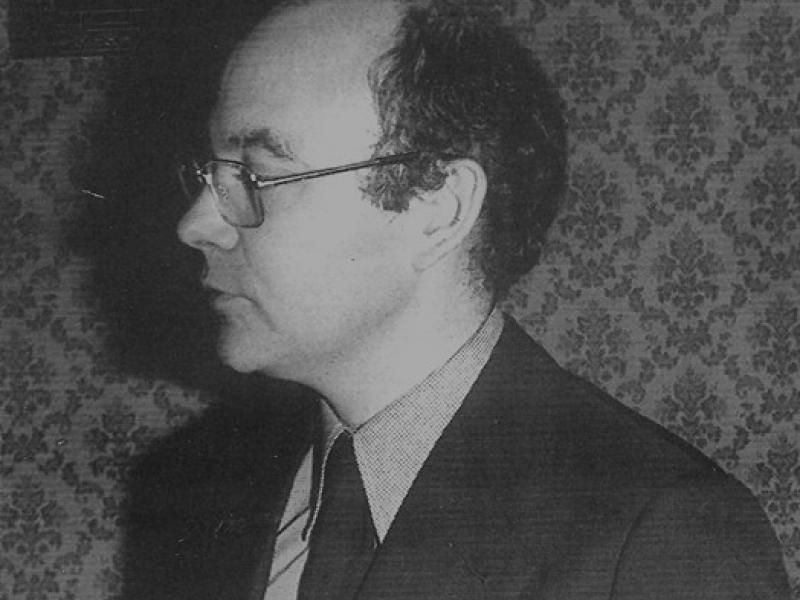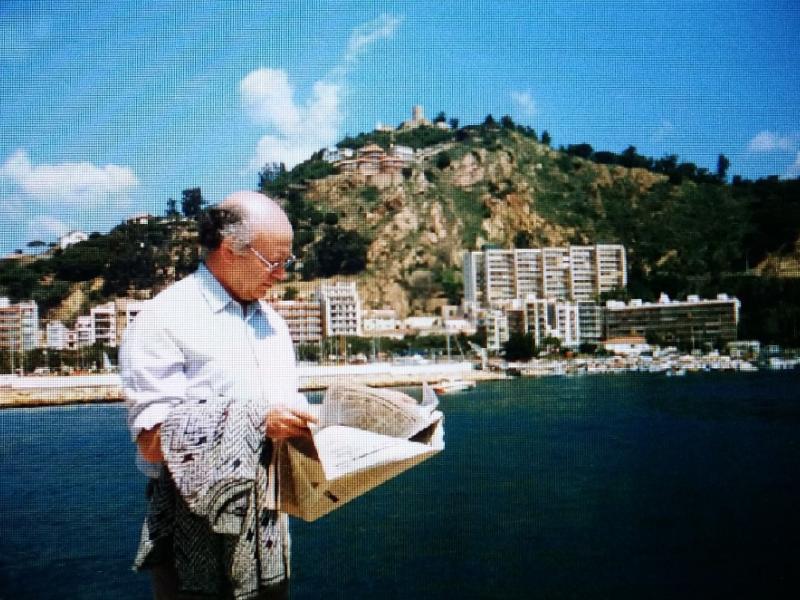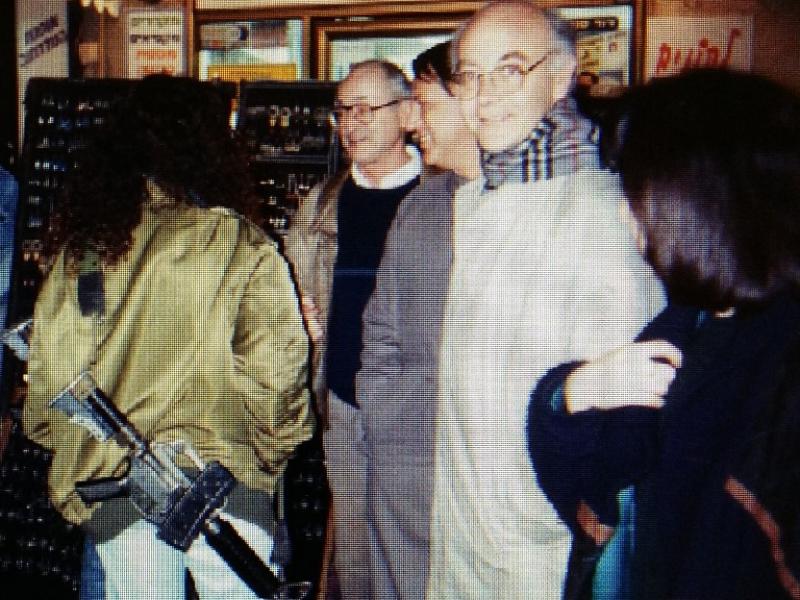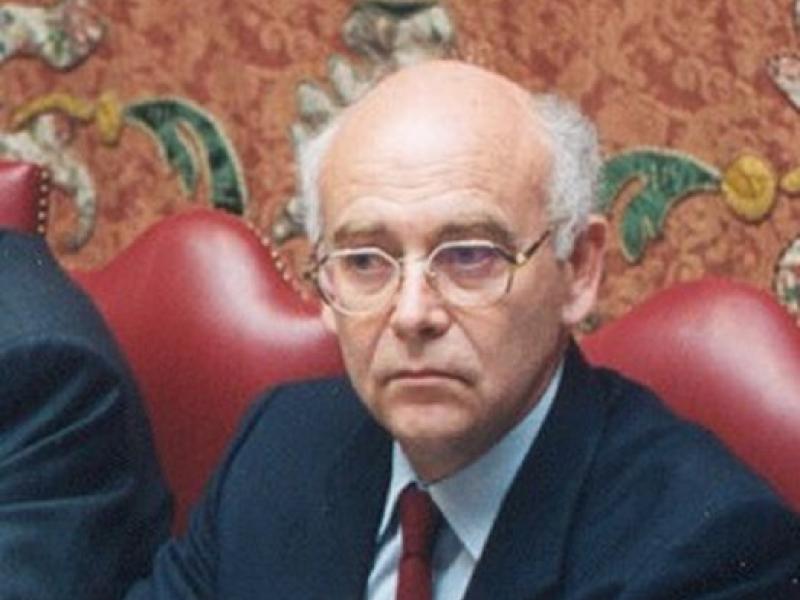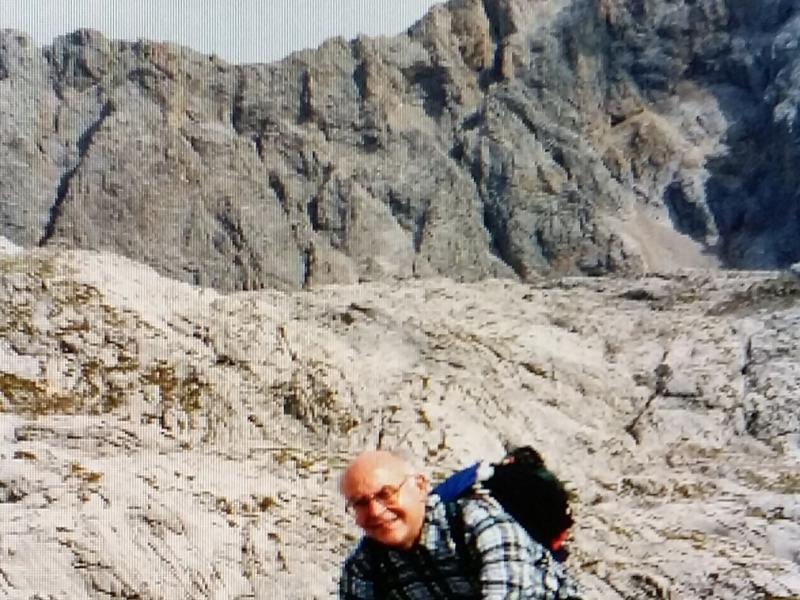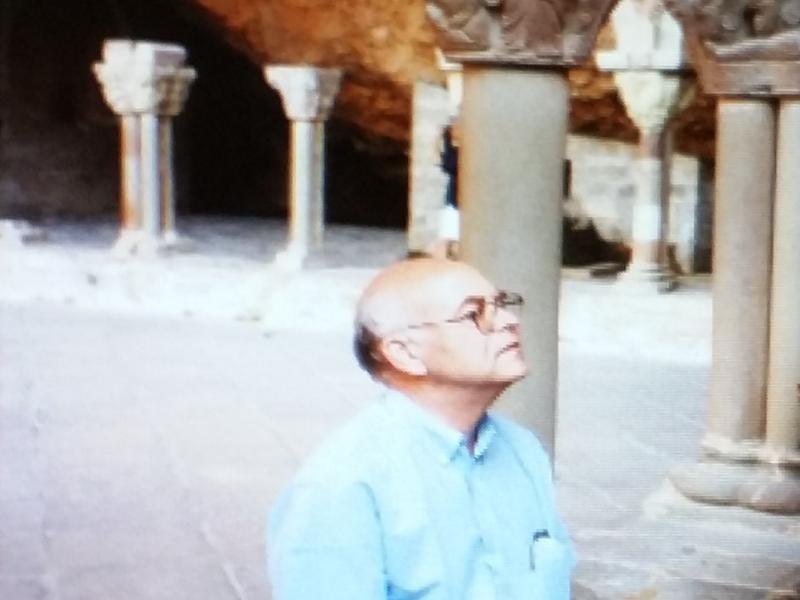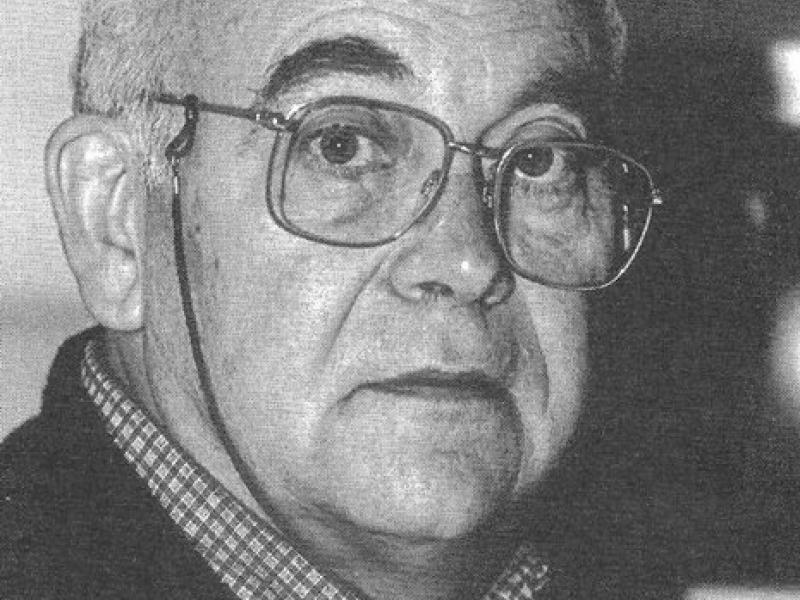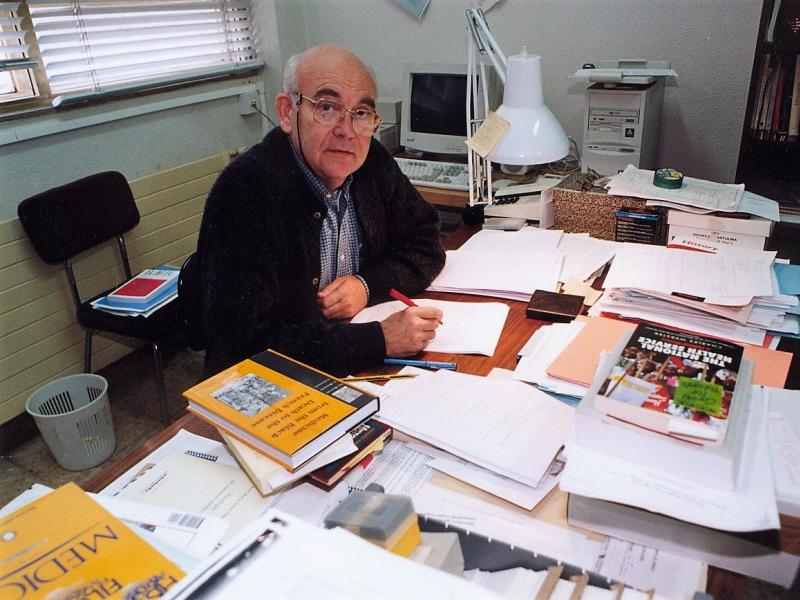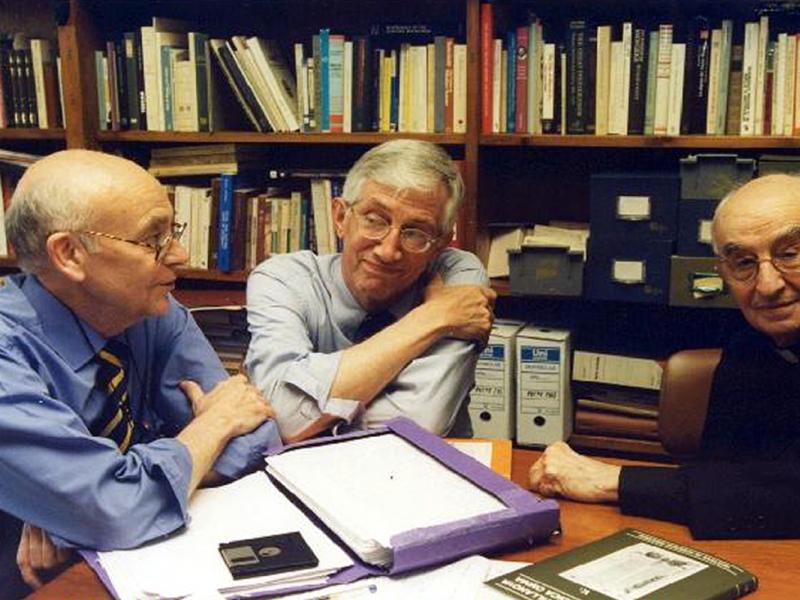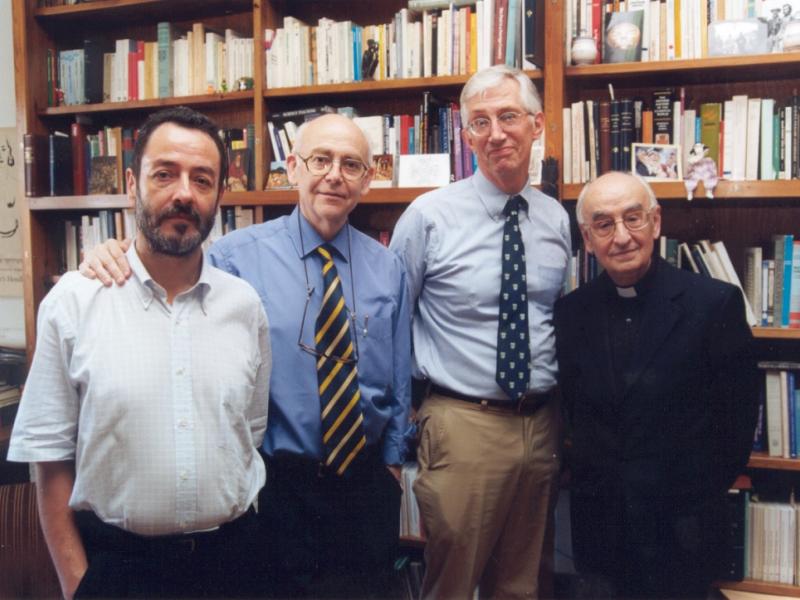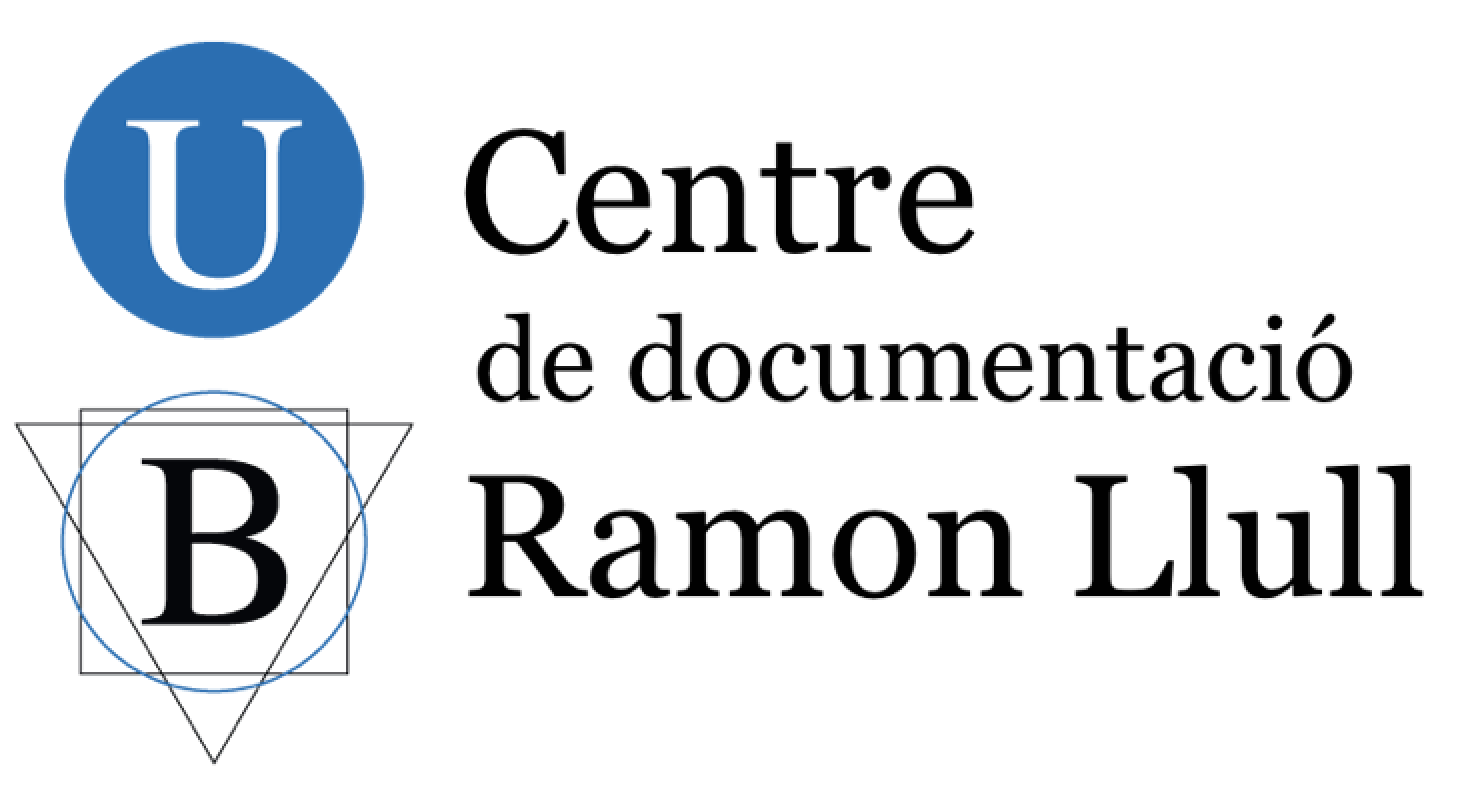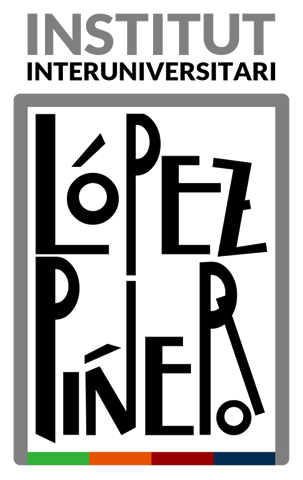Luis García Ballester (1936-2000)
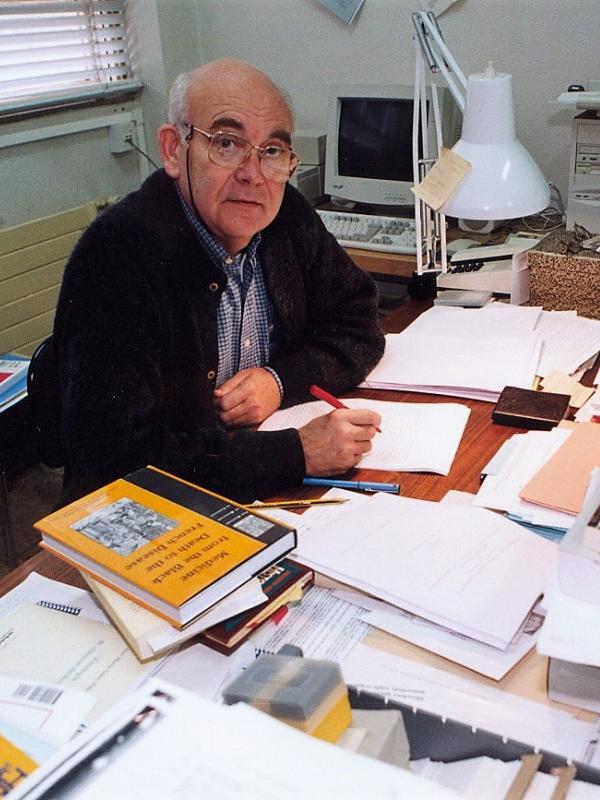
Luis García Ballester was born in the Cabanyal neighbourhood of the city of Valencia shortly before the start of the Spanish Civil War (14 February 1936). He studied medicine at the Universitat de València. However, attracted by the historical aspects of his profession, he took a PhD whose thesis was on the History of Medicine, directed by José Mª López Piñero (Alma y enfermedad en la obra de Galeno, ‘Soul and Disease in the Work of Galen’, 1968), and he never subsequently practised as a doctor.
After some years teaching in Murcia, he was made an associate professor in the History of Medicine at the Universitat de València (1971) and, that same year, at Granada, where he obtained the chair (1976), which he occupied soon afterwards at Santander (1982). As a research professor of the CSIC (1987), he founded the Department of the History of Science at the Institució Milà i Fontanals in Barcelona. Personal reasons led him to once again occupy the chair at Santander (1996), which he did until his death at home in Puente de Arce (10 October 2000). This personal and professional biography was complemented by stays at some of the most prestigious academic centres in Europe and North America.
A member of an exceptional generation that, on either side of the Atlantic, has been crucial for studying the history of science, Luis García Ballester was the author of a great deal of highly valued research work.
From Galen to Arnald of Villanova
The work of Galen, destined to have a profound, lasting influence on the history of medicine with what is now known as Galenism, was the subject of many of his early studies, including his doctoral thesis and the summary Galeno en la sociedad y en la ciencia de su tiempo (‘Galen in the Society and the Science of his Time’, 1972). To these studies he applied a perspective and a methodology that would be prevalent in all his research work and which transcended the internalism that was still hampering intellectual history. Despite embarking upon new lines of research that would no longer be focused on Antiquity, he never abandoned his studies of Galen, to whom he devoted a large number of specialist articles. He became increasingly interested in the subsequent spread of Galenism and, in particular, in the reintroduction of the Greek doctor’s works to medieval Europe (the “new Galen”, an expression he coined).
If Galen’s fundamental work always attracted him, that of Arnald of Villanova, the great medical figure that the Catalan Countries – to be more specific, his native Valencia – gave to medieval Latin Europe, was the subject of more wide-ranging initiatives. It was necessary to make amends for the abandonment suffered by Arnald the doctor, a leading figure of medieval Latin Galenism, relegated by other true or spurious aspects of the man. And it had to be done in the best way, with methodical systematic editions of his medical works – a mainstay of Galenism in the universities of the period – accompanied by studies aimed at analysing and updating each and every one of the aspects expounded in Arnald’s treatises. And, what’s more, it was necessary to do it in this country, but with international perspective and ambition, trusting the studies and the editions to the most able professionals in the world.
The result was the setting in motion, in 1975, of a project that was the apple of his eye for his entire life and which became extremely prestigious, the Arnaldi de Villanova Opera Medica Omnia (AVOMO), the co-direction of which he gave to Juan A. Paniagua and Michael R. McVaugh, perhaps the researchers who did the most and the best work on Arnald’s medical works. Not based in one particular place, like his career in those years, moving between Granada, Santander and Barcelona, AVOMO was to a large extent a personal endeavour, made possible thanks to the drive, the perseverance and the obstinacy of which he was capable. It is still in existence thanks to the support of its latest publishers and patrons, the Universitat de Barcelona and the Fundació Noguera.
The construction of a new “medical system”, the Jews and the Moriscos
The intellectual history was out of necessity obliged to encounter the social history, and thus they enriched one another. It was the sign of a period of renewal in the study of history. Despite not initially studying to be a historian, he fully assimilated this, and he always strove to transfer this renewal to a history of medicine that in the Iberian Peninsula was barely surviving, decontextualized and isolated. So it was that the study of Arnald of Villanova and the transmission of Galenism led to the study of the practice of medicine in the territories that made up the Crown of Aragon in the thirteenth and fourteenth centuries, the crucial period for the diffusion of a new “medical system” based on Galenism and also on the new university institution, and he was able to see the importance of the “open system” of educating non-university trained doctors, historiographical labels that he himself created and spread.
In the same way that the “Arnald Project” had been thoroughly planned, this one had to be too: it was necessary to resort to the sources, all the sources. This meant designing a systematic research plan for all the historical archives in Catalonia, the Valencian Country, the Balearic Islands and Aragon, no less, following the fundamental example of Lluís Comenge, Josep M. Roca and – most particularly, due to the impact that the rescue of his archive had – Josep Rodrigo Pertegàs. It was obvious that the initial methodology and the scope, considered necessary in order to ensure valuable and really new contributions, were too much for one single person to cope with. It was, in fact, a project with an unparalleled scope not just in the history of medicine but in general history too, and for which he decided to use the new information management technologies, then in their infancy. Identical interests united Luis and Michael R. McVaugh, with whom he was friends for many years, in a project that became a common one, while the new wind that, in the promotion of research, was blowing in Spain in the 1980s produced a group of young researchers – historians, in accordance with his express wish – who helped to advance the project, some of whom are now members of the SCIÈNCIA.CAT team.
Closely linked to this latest line of research, the medicine of the religious and cultural minorities active in the medieval and early modern Iberian Peninsula – Mudéjares/Moriscos and Jews – was another of the subjects that most interested García Ballester, right from the early years of his career, when he wrote two successive books about it with contributions that are still valid. He subsequently insisted in a series of important articles on the reception and survival of Galenism in these minorities, and on the delicate question of their relationship with Christian scholastic medicine.
Catalan, a “new instrument of scientific and technological communication”
As a result of his studies on the history of medicine in the different territories that were part of the old Crown of Aragon, particularly his native Valencia, Luis García Ballester soon realized the importance of using the vernacular language – in this case, Catalan – as an “instrument of scientific and technological communication”, as he liked to put it. It is an aspect on which he never stopped insisting in books and articles from the middle of the 1970s onwards. The publication of one of the Catalan translations of the Epistola de avibus nobilibus, a most outstanding text about falconry in Catalan that he published around that time (1975), took place in this context. This edition marks an important milestone in studies on medieval falconry in Catalonia, or – what is the same – on the spread of Galenism to animal medicine.
Even more valuable was his work encouraging other editions and studies of the scientific patrimony in the vernacular, a task not only performed with regard to Catalan, and of which we must mention some examples. First, the publication of the Catalan translation by the Majorcan surgeon Guillem Corretger, made in the early fourteenth century, of Theodoric Borgognoni’s Chirurgia. This translation, which is the oldest surviving medical text written in Catalan, was very important in the process of spreading Galenism among non-university trained doctors in the Catalan Countries. Aware of this fact, he always insisted, in his enthusiastic way, on the achievement of this goal. Other outstanding old Catalan texts, like the Catalan Tròtula by Joan de Fulgines, were also the subject of doctoral assignments and he likewise promoted the study or the publication of some significant treatises on the plague in Catalan.
They were the beginnings of the study of the process of vernacularization of science and technology in Catalan in the Middle Ages and the Renaissance. This was linked to growing international research into this subject, hitherto neglected by the history of science, from an interdisciplinary perspective, and which in Catalan circles had the fundamental contributions of Lluís Faraudo de Saint-Germain and a few philologists, which had been the rule everywhere. The enthusiastic support and drive of Luis García Ballester was fundamental for initiating the line of research that has now materialized at SCIÈNCIA.CAT. For him, the study of this process had necessarily to be based on the exhaustive cataloguing of the surviving materials (a task now done on the database Sciència.cat DB) and it had to generate reliable editions of the works, but also their study and that of the technical vocabulary, which he understood as being essential for overseeing the “social penetration” of science.
Although he was only able to witness the beginning of Digital Humanities, he immediately saw the great new potential it offered, and he began to use it in his research, while imagining new projects that would be possible thanks to it, such as the production of a “Corpus Medicorum Catalanorum” to classify all the old Catalan doctors and their works.
The possibilities of Castile
Luis García Ballester, however, did not focus his intellectual interest solely on the Catalan-Aragonese framework. The medieval kingdom of Castile was another powerful centre of attraction for him, convinced as he was of the close bonds between the different Iberian kingdoms. The penetration of Galenism in Castile, the weak development of the university institution, the strong interaction of the “three cultures”, all in a context of an apparent dramatic lack of historical sources and of pronounced gaps in research, were challenges hard to resist, even more so once he occupied the chair of the History of Medicine at Santander (1982-1987 and 1996-2000), in the territory of that old kingdom.
Devoted to coordinating a major work of synthesis about the history of science and technology in the old kingdom of Castile, which in actual fact had to be put together from a large amount of original research promoted to a large extent by him, all over Castilian territory he also encouraged the production of critical editions of unpublished works, for instance that a fourteenth-century treatise on commercial arithmetic and coinage assaying.
These contributions were not the only ones that Luis García Ballester made to the history of science in medieval Castile. Published posthumously, La búsqueda de la salud (‘The Search for Health’, 2001) is a learned summary of previous personal and other original research work done in his last years all over Castilian territory. Not only does this splendid book successfully rise to those challenges but it also offers a stream of very interesting data and ideas, especially those that refer to the historical contextualization of the medieval medical patrimony in the Castilian vernacular, for the understanding of which he stressed the crucial part played by the Jewish minority.
For his contributions, initiatives and encouragement, and for his personal and intellectual generosity, the researchers of SCIÈNCIA.CAT acknowledge their debt to him.
To find out more
Besides the short introductions published in the three books that include selections of his works (see Bibliography of Luis García Ballester), the following obituaries include important biographical and intellectual information about him:
- A. Albarracín - J. L. Peset, "En recuerdo de Luis García Ballester", Asclepio, 53/1 (2001), 331-332
- R. Barkai, "Luis García Ballester y la medicina de las minorías en España", Dynamis, 21 (2001), 471-478
- R. Ballester, "«Hay hombres que luchan toda la vida: esos son los imprescindibles» (B. Brecht). Luis García Ballester, un historiador ejemplar", Dynamis, 22 (2002), 477-480
- A. Carré, "Luis García Ballester (1936-2000)", Llengua & Literatura, 12 (2001), 559-560
- L. Cifuentes, "In memoriam Lluís García Ballester: herència i record", Arxiu de Textos Catalans Antics, 20 (2001), 535-542
- L. Cifuentes, "Luis García Ballester (1936-2000)", Estudis Romànics, 26 (2004), 467-472
- L. Cifuentes - C. Ferragud, “Perfil d'urgència: Lluís Garcia Ballester”, El Temps, 857 (2000) [suplement El Temps d'Història, p. xvi]
- J. M. Comelles, "Luis García Ballester, antropólogo", Dynamis, 22 (2002), 487-492
- Dynamis, "Luis García Ballester (1936-2000), in memoriam", Dynamis, 21 (2001), 435-436
- R. K. French - A. Cunningham, "Luis", Dynamis, 21 (2001), 453-455
- R. García Cárcel, "En la muerte de Luis García Ballester", Dynamis, 22 (2002), 485-486
- D. Jacquart, "Contribution de Luis García Ballester à l'histoire intellectuelle de la médecine médiévale", Dynamis, 21 (2001), 465-469
- J. M.ª López Piñero, "Fragmentos del constante recuerdo de Luis García Ballester: I. Los comienzos en los años sesenta", Dynamis, 21 (2001), 437-446
- P. Marset Campos, "Luis García Ballester (Valencia, 1939-Santander, 2000): amor a la ciencia, amor a las personas", Cronos, 3 (2000), 3-12
- M. R. McVaugh, "Luis García Ballester: personal recollections", Dynamis, 22 (2002), 473-476
- V. Nutton, "Luis García Ballester", Medical History, 45 (2001), 115-116
- V. Nutton, "Luis García Ballester and Galen", Dynamis, 21 (2001), 457-464
- J. A. Paniagua, "Ante la muerte de un amigo", Dynamis, 21 (2001), 447-452
- E. Rodríguez Ocaña, "Luis García Ballester, profesor en Granada: un recuerdo personal", Dynamis, 22 (2002), pp. 481-484
- G. Sánchez, "Luis García Ballester, universitario", Dynamis, 22 (2002), pp. 493-494
Vegeu també:
- Diccionari d'historiografia catalana (Barcelona, 2003), s.v. "Lluís Garcia i Ballester" (M. R. McVaugh)
Captions and provenance of the illustrations
1. Valencia (about 1946)
2. Bonn (August 1956)
3. Aachen (July 1958)
4. El Garbí (Valencia) (autumn 1964)
5. Faculty of Medicine, Granada (1973)
6. Admission to the Real Academia de Medicina de Granada (25/01/1975)
7. Blanes (Girona) (1989)
8. Jerusalem (December 1992)
9. Tribute to Juan Antonio Paniagua (Pamplona, November 1994)
10. Picos de Europa (May 1996)
11. San Juan de la Peña (Huesca) (Summer 1998)
12. Faculty of Medicine, Santander (October 1998)
13. Faculty of Medicine, Santander (October 1998)
14. Meeting of the editorial board of AVOMO (Barcelona, May 2000), with Juan Antonio Paniagua and Michael R. McVaugh
15. Meeting of the editorial board of AVOMO (Barcelona, May 2000), with Juan Antonio Paniagua, Michael R. McVaugh and Jon Arrizabalaga
Provenance of the images: family archive (Puente Arce, Cantabria), Fernando Salmón (Univ. de Cantabria, Santander) and Jon Arrizabalaga (IMF-CSIC, Barcelona).
Bibliography of Luis García Ballester
This bibliography reorganizes, corrects and completes those published in two of the books listed in the first of the following sections (Variorum Galen and Artifex). It does not include forewords, reviews and informative publications, nor does it take into account the doctoral theses he directed.
Contents
I. Collections of articles
II. Galen and Galenism
III. Other studies on medicine in classical Antiquity
IV. Arnald of Villanova
V. Medicine in medieval Christian society
VI. Medicine in marginalized minorities
VII. The history of science in the Middle Ages
VIII. Medicine in the early modern period
IX. Medicine in the contemporary period
X. Bibliography and methodology
XI. Works of reference
XII. Editions of works
XIII. Translations and revisions
XIV. Obituaries of distinguished researchers
I. Collections of articles
- Medicine in a Multicultural Society: Christian, Jewish and Muslim Practitioners in the Spanish Kingdoms, 1222-1610, ed. J. Arrizabalaga - M. Cabré - F. Salmón, Aldershot, Ashgate Variorum (Variorum Collected Studies Series, CS702), 2001, xii + 374 pp.
- Galen and Galenism: Theory and Medical Practice from Antiquity to the European Renaissance, ed. J. Arrizabalaga - M. Cabré - L. Cifuentes - F. Salmón, Aldershot, Ashgate Variorum (Variorum Collected Studies Series, CS710), 2002, 332 pp.
- Artifex factivus sanitatis: saberes y ejercicio profesional de la medicina en la Europa pluricultural de la Baja Edad Media, ed. G. Olagüe de Ros - E. Rodríguez Ocaña, Granada, Universidad de Granada (Biblioteca de Bolsillo/Collectanea, 2), 2004, 556 pp.
II. Galen and galenism
- "El galenismo de transición en la España del siglo XVII: Luis Rodríguez de Pedrosa", in Actas del II Congreso Nacional de Historia de la Medicina (Salamanca, 23-25 septiembre 1965), Madrid, Sociedad Española de Historia de la Medicina, 1965, vol. 1, pp. 385-392
- "El hipocratismo de Galeno", Boletín de la Sociedad Española de Historia de la Medicina, 8 (1968), 22-28
- "Lo médico y lo filosófico-moral en las relaciones entre alma y enfermedad: el pensamiento de Galeno", Asclepio, 20 (1968), 99-134
- "La psyque en el somaticismo psíquico de la Antigüedad. La actitud de Galeno: un aspecto de la polémica ciencia-creencia en la medicina helenística", Episteme: rivista critica di storia delle scienze mediche e biologiche, 3 (1969), 195-209
- “Alma y enfermedad en la obra de Galeno: introducción, traducción y comentario a ‘Las facultades del alma se derivan de la complexión humoral del cuerpo’, Medicina Española, 61 (1969), 38-45
- "Medicina y ética en la obra de Galeno", Medicina Española, 62 (1969), 213-227
- "La historia clínica en la patología de Galeno", Medicina Española, 63 (1970), 155-160
- "La utilización de Platón y Aristóteles en las obras tardías de Galeno", Episteme: rivista critica di storia delle scienze mediche e biologiche, 5 (1971), 112-120
- "Aproximación genética a la obra anatómica de Galeno", Medicina Española, 65 (1971), 191-209
- "Galeno (c. 130 - c. 200): acercamiento histórico-social a su biografía científica", Medicina & Historia, 2a época, 12 (April 1972), 7-26
- [with J. Samsó (2)], "Tradición y novedad en el galenismo árabe de los siglos IX a XI: la doctrina del pulso, el pronóstico y un caso de aplicación de masaje cardíaco", Al-Andalus, 37 (1972), 337-351
- Alma y enfermedad en la obra de Galeno: traducción y comentario del escrito ‘Quod animi mores corporis temperamenta sequantur’, Valencia - Granada, Universidad de Granada, 1972, 376 pp.
- Galeno en la sociedad y la ciencia de su tiempo (c. 130 - c. 200 d. de C.), Madrid, Guadarrama, 1972, 291 pp.
- "Diseases of the soul in Galen: the impossibility of a Galenic psychotherapy", Clio Medica, 9 (1974), 35-43
- "The circulation and use of medical manuscripts in Arabic in sixteenth-century Spain", Journal for the History of Arabic Science, 3/2 (1979), 183-199 [repr.: Variorum Galen, XI]
- "Galen as a medical practitioner: problems in diagnosis", in V. Nutton (ed.), Galen: Problems and Prospects, London, Wellcome Institute for the History of Medicine, 1981, pp. 13-26
- "Experiencia y especulación en el diagnóstico galénico", Dynamis, 1 (1981), 189-221
- [with R. Moreno (1)], "El dolor en la teoría y práctica médicas de Galeno", Dynamis, 2 (1982), 3-24
- "Enfermo y enfermedad en la obra de Galeno: problemas en torno al diagnóstico médico", Medicina & Historia, 3a época, 10 (1985), 3-26
- “Galeno: mito e incitación en la patología médica occidental”, El Médico, 4-5 (1985)
- “La enfermedad en Galeno”, in A. Albarracín (ed.), Historia de la enfermedad, Madrid, Centro de Estudios Wellcome-España, 1987, pp. 132-141
- "Soul and body, disease of the soul and disease of the body in Galen's medical thought", in P. Manuli - M. Vegetti (eds.), Le opere psichologiche di Galeno: atti del Terzo colloquio Galenico Internazionale (Pavia, 10-12 settembre 1986), Naples, Bibliopolis, 1988, pp. 117-158 [repr.: Variorum Galen, III]
- [with C. Vázquez de Benito (2)], "Los médicos judíos castellanos del siglo XIV y el galenismo árabe: el Kitab al-tibb al-qastali al-maluki (Libro de medicina castellana regia), ca. 1312", Asclepio, 42 (1990), 119-147
- [with J. Martínez Gázquez (1)], "Las Epistulae de flebotomia y los Calendaria en el galenismo práctico de los siglos XIII y XIV en la Corona de Aragón", in J. A. López Pérez (ed.), Galeno: obra, pensamiento e influencia. Coloquio internacional celebrado en Madrid, 22-25 de marzo de 1988, Madrid, UNED, 1991, pp. 281-290
- [with J. Arrizabalaga (1) and J. L. Gil Aristu (3)], "Del manuscrito al primitivo impreso: la labor editora de Francesc Argilagues (fl. ca. 1470-1508) en el renacimiento médico italiano", Asclepio, 43 (1991), 3-49
- "On the origin of the 'six non-natural things' in Galen", in J. Kollesch - D. Nickel (eds.), Galen und das hellenistische Erbe: Verhandlungen des IV. internationalen Galen-Symposiums veranstaltet vom Institut für Geschichte der Medizin am Bereich Medizin (Charité) der Humboldt-Universität zu Berlin 18.-20. September 1989, Berlin, Springer, 1993, pp. 105-115 [repr.: Variorum Galen, IV]
- "Tradición e innovación en el helenismo: su uso en la medicina por Galeno", in Actas de las 1as Jornadas de Didáctica de Lenguas Clásicas (Mollina, Málaga, 1994), Seville, Junta de Andalucía: Consejería de Educación y Ciencia, 1994, pp. 3-14
- "Elementos para la construcción de las historias clínicas en Galeno", Dynamis, 15 (1995), 47-65
- "Artifex factivus sanitatis: health and medical care in medieval Latin Galenism", in D. Bates (ed.), Knowledge and the Scholarly Medical Traditions, Cambridge, Cambridge University Press, 1995, pp. 127-150 [repr.: Variorum Galen, VI]
- "Improving health: a challenge to European medieval Galenism”, in J. Woodward - R. Jütte (eds.), Coping with Sickness: Perspectives on Health Care, Past and Present, Sheffield, European Association for the History of Medicine and Health, 1996, pp. 53-71 [sp. trans.: Artifex, XI]
- "Alma y cuerpo: enfermedad del alma y enfermedad del cuerpo en el pensamiento médico de Galeno", Revista de la Asociación Española de Neuropsiquiatría, 16 (1996), 705-735
- "L'insegnamento del galenismo nella Montpellier del tridicesimo secolo: come uno studente medievale di medicina apprendeva la clinica dell'infiammazione (apostema calidum)", in M. Vegetti - S. Gastaldi (eds.), Studi di storia della medicina antica e medievale in memoria di Paola Manuli, Pavia, La Nuova Italia, 1996, pp. 112-123
- "Introducción general" and "Introducción", in Galeno. Sobre la localización de las enfermedades (De locis affectis), sp. trans. and notes by S. Andrés Aparicio, Madrid, Gredos, 1997, pp. 7-86 and 89-120 [abr. eng. trans.: Variorum Galen, I]
- "The ‘new Galen’: a challenge to Latin galenism in thirteenth-century Montpellier", in K. D. Fischer - D. Nickel - P. Potter (eds.), Text and Tradition: Studies in Ancient Medicine and its Transmission Presented to Jutta Kollesch, Leiden, Brill, 1998, pp. 55-83 [repr.: Variorum Galen, V]
- "Galenismo y enseñanza médica en la Universidad de Salamanca del siglo XV", Dynamis, 20 [=El aprendizaje de la medicina en el mundo medieval: las fronteras de la enseñanza universitaria, ed. Cornelius O'Boyle, Roger French and Fernando Salmón] (2000), 209-247 [repr.: Artifex, VIII] [rev. and abr. eng. trans.: Variorum Galen, X]
III. Other studies on medicine in classical Antiquity
- "El saber morfológico en los saberes de Praxágoras de Cos", Boletín de la Sociedad Española de Historia de la Medicina, 7 (1966), 1-10
- "La idea de progreso en la Antigüedad clásica: nota a propósito de un reciente libro de Ludwig Edelstein", Asclepio, 20 (1968), 255-258
- "Medicina y tradición hipocráticas: nota a propósito de un libro del profesor Laín", Medicamenta, 54 (1970), 379-383
- "Los orígenes del saber anatómico occidental: del Corpus Hippocraticum a la anatomía alejandrina", Medicina & Historia, 2a época, 25 (June 1973), 7-26
- "De la anatomía alejandrina al Corpus Galenianum", Medicina & Historia, 2a época, 37 (July 1974), 7-26
IV. Arnald of Villanova
- "Arnau de Vilanova (c. 1240-1311) y la reforma de los estudios médicos en Montpellier (1309): el Hipócrates latino y la introducción del nuevo Galeno", Dynamis, 2 (1982), 97-158 [repr.: Artifex, VI]
- [with P. Gil Sotres (2)], Teorías sobre la fiebre y averroismo médico en Montpellier: Bernardo de Gordon y Arnau de Vilanova, Santander - Pamplona, Universidad de Cantabria - EUNSA (Cuadernos de historia de la medicina, 2), 1986, 43 pp.
- "Las influencias de la medicina islámica en la obra médica de Arnau de Vilanova", Estudi General, 9 [=El debat intercultural als segles XIII i XIV: actes de les I Jornades de Filosofia Catalana (Girona, 25-27 abril 1988), ed. Marcel Salleras] (1989), 79-95
- "Hacia el establecimiento de un 'canon' de las obras médicas de Arnau de Vilanova", Arxiu de Textos Catalans Antics, 14 [=Actes de la I Trobada internacional d'estudis sobre Arnau de Vilanova, 2] (1995), 23-29 [also in J. Perarnau i Espelt (ed.), Actes de la I Trobada Internacional d'Estudis sobre Arnau de Vilanova, Barcelona, Institut d'Estudis Catalans, 1995, vol. 2, pp. 23-29]
- [with F. Salmón (2) and E. Sánchez Salor (3)], "Tradición manuscrita y autoría: sobre la posible autenticidad del comentario de Arnau de Vilanova al De morbo et accidenti de Galeno", Arxiu de Textos Catalans Antics, 14 [=Actes de la I Trobada internacional d'estudis sobre Arnau de Vilanova, 2] (1995), 31-74 [also in J. Perarnau i Espelt (ed.), Actes de la I Trobada Internacional d'Estudis sobre Arnau de Vilanova, Barcelona, Institut d'Estudis Catalans, 1995, vol. 2, pp. 31-74]
- [with M. R. McVaugh (1)], "Therapeutic method in the later middle ages: Arnau de Vilanova on medical contingency", Caduceus, 11 (1995), 73-86
- "El ‘Proyecto Arnau’: origen y gestación", in J. Arrizabalaga (ed.), Arnaldi de Villanova Opera Medica Omnia (1975-2000): 25 anys d’un projecte internacional, Barcelona, Societat Catalana d’Història de la Ciència i de la Tècnica, filial de l’IEC, 2001, pp. 13-21
V. Medicine in medieval Christian society
- "La medicina valenciana del siglo XIV", in Actas del I Congreso Español de Historia de la Medicina (Madrid - Toledo, 15-17 de abril de 1963), Madrid, Sociedad Española de Historia de la Medicina, 1963, vol. 1, pp. 379-386
- "El tratado del ‘mal de la pedra’ de Joan Jacme (s. XIV)", in Actas del II Congreso Nacional de Historia de la Medicina (Salamanca, 23-25 septiembre 1965), Madrid, Sociedad Española de Historia de la Medicina, 1966, vol. 1, pp. 93-102
- "Tres bibliotecas médicas en la Valencia del siglo XV", Asclepio, 18-19 (1966-1967), 383-405
- "La cirugía en la Valencia del siglo XV", Cuadernos de Historia de la Medicina Española, 6 (1967), 155-171
- "Aproximación a la medicina bajomedieval en Valencia", Cuadernos de Historia de la Medicina Española, 8 (1969), 45-79
- "Arabismo y escolástica en la medicina bajomedieval", in III Congreso Nacional de Historia de la Medicina: actas (Valencia, 10-12 de abril de 1969), Madrid, Sociedad Española de Historia de la Medicina, 1971, vol. 2, pp. 15-30
- "El privilegio concedido en 1479 a los cirujanos de Valencia para disecar cadáveres", in III Congreso Nacional de Historia de la Medicina: actas (Valencia, 10-12 de abril de 1969), Madrid, Sociedad Española de Historia de la Medicina, 1971, vol. 2, pp. 73-76
- [with G. García González (2)], "Nota sobre la asistencia a los locos y ‘desfallecidos de seso’ en la Córdoba medieval: el Hospital de Jesucristo (1419)", Asclepio, 30 (1978), 23-31
- "Los orígenes de la profesión médica en Cataluña: el ‘collegium’ de médicos de Barcelona (1342)”, in Estudios dedicados a Juan Peset Aleixandre, Valencia, Universitat de València, 1982, vol. 1, pp. 129-149 [repr.: Artifex, V]
- [with A. Domínguez (1)], "El tratado De anathomia (c. 1280) de Juan Gil de Zamora (c. 1241-c. 1320)", Dynamis, 3 (1983), 341-372
- "La circulación de las ideas médicas en la Castilla de Alfonso X el Sabio", Revista de Occidente, 43 [=Alfonso X y su época] (1984), 85-107
- "El papel de las instituciones de consumo y difusión de ciencia médica en la Castilla del siglo XIII: el Monasterio, la Catedral y la Universidad", Dynamis, 4 (1984), 33-63 [repr.: Artifex, VII]
- [with A. Rubio (2)], “L'influence de Montpellier dans le contrôle social de la profession médicale dans le royaume de Valence au XIVe siècle", in Actes du 110e Congrès national des sociétés savantes (Montpellier, 1985): Section d'histoire des sciences et des techniques, vol. 2 (Histoire de l'École médicale de Montpellier), Paris, C.T.H.S., 1985, pp. 19-30
- "La Facultad de Medicina de Montpellier: tradición y novedad en la patología médica de la Corona de Aragón durante la transición del siglo XIII al XIV", in El Regne de Mallorca i el Sud Francès, Mallorca, Institut d’Estudis Baleàrics, 1986, pp. 21-40
- "Medical science in thirteenth-century Castile: problems and prospects", Bulletin of the History of Medicine, 61 (1987), 183-202 [repr.: Variorum Medicine, I]
- "La recepción del Colliget de Averroes en Montpellier (c. 1285)", in Homenaje al Prof. Darío Cabanelas, Granada, Universidad de Granada, 1987, pp. 317-332 [repr.: Variorum Galen, VIII]
- "Panorama de la medicina en una sociedad medieval mediterránea: la Valencia cristiana bajomedieval", Dynamis, 7-8 (1987 - 1988), 59-115 [repr.: Artifex, II]
- La medicina a la València medieval: medicina i societat en un país medieval mediterrani, Valencia, Edicions Alfons el Magnànim - Institució Valenciana d'Estudis i Investigació (Descobrim el País Valencià, 29), 1988, 128 pp.
- [with M. R. McVaugh (2)], "Nota sobre el control de la actividad médica y quirúrgica de los barberos (‘barbers’, ‘barbitonsores’) en los Furs de Valencia de 1329", in Homenatge al Dr. Sebastià García Martínez, Valencia, Universitat de València - Generalitat Valenciana: Conselleria de Cultura, Educació i Ciència, 1988, vol. 1, pp. 73-88
- "La ciencia en Valencia después de la conquista", in En torno al 750 aniversario: antecedentes y consecuencias de la conquista de Valencia, Valencia, Generalitat Valenciana: Consell Valencià de Cultura, 1989, vol. 2, pp. 239-254
- "La medicina en el reinado de Pedro el Ceremonioso", in Pere el Cerimoniós i la seva època, Barcelona, CSIC: Institució Milà i Fontanals (Anuario de Estudios Medievales, annex 24), 1989, pp. 133-150
- [with M. R. McVaugh (2) and A. Rubio (3)], Medical Licensing and Learning in Fourteenth-Century Valencia, Philadelphia, The American Philosophical Society (Transactions of the American Philosophical Society, 79, part 6), 1989, 128 pp. [repr.: Variorum Medicine, III]
- [with M. R. McVaugh (1)], "The medical faculty at early fourteenth-century Lérida", History of Universities, 6 (1989), 1-27
- [with J. Arrizabalaga (1) and F. Salmón (3)], "A propósito de las relaciones intelectuales entre la Corona de Aragón e Italia (1470-1520): los estudiantes de medicina valencianos en los Estudios Generales de Siena, Pisa, Ferrara y Padua", Dynamis, 9 (1989), 117-147
- [with L. Cifuentes (1)], "Els professionals sanitaris de la Corona d'Aragó en l'expedició militar a Sardenya de 1354-1355", Arxiu de Textos Catalans Antics, 9 (1990), 183-214
- "Medicina i ciència en la València del Renaixement (1250-1520)", in D. Bramon (ed.), Lluís de Santàngel, un nou home, un nou món, Valencia, Generalitat Valenciana, 1992, pp. 155-172
- [with J. Arrizabalaga (1) and F. Salmón (3)], "La medicina valenciana y sus relaciones con Italia entre 1470 y 1520", in M. Ardit (ed.), Lluís de Santàngel i el seu temps: congrés internacional (València, 5 al 8 d'octubre, 1987), Valencia, Generalitat Valenciana, 1992, pp. 401-417
- "Medicina y filosofía natural en la Europa latina de los siglos XII y XIII: un debate abierto", Arbor, 142 [=Historia de la ciencia: perspectivas historiográficas] (1992), 119-145
- "Medical ethics in transition in 13th- 14th centuries Latin medicine: new problems on physician-patient relationship, and the doctor's fee", in A. Wear - J. Geyer-Kordesch - R. K. French (eds.), Doctors and Ethics: The Earlier Historical Setting of Professional Ethics, Amsterdam - Atlanta, Rodopi (Clio Medica, 24), 1993, pp. 38-70
- [with A. Domínguez (2)], "El mundo médico de la Historia naturalis (ca. 1275-1296) de Juan Gil de Zamora", Dynamis, 14 (1994), 249-267
- [with R. K. French (2), J. Arrizabalaga (3) and A. Cunningham (4)] (eds.), Practical Medicine from Salerno to the Black Death, Cambridge, Cambridge University Press, 1994, xiii + 402 pp.
- "Introduction: practical medicine from Salerno to the Black Death", in L. García Ballester - R. K. French - J. Arrizabalaga - A. Cunningham (eds.), Practical Medicine from Salerno to the Black Death, Cambridge, Cambridge University Press, 1994, pp. 1-29
- "Medicina universitaria y no universitaria en la Castilla de los siglos XIII y XIV, en el marco de las novedades europeas", in C. Codoñer - J. A. González Iglesias (eds.), Antonio de Nebrija: Edad Media y Renacimiento, Salamanca, Universidad de Salamanca, 1994, pp. 335-345
- "Universidad y nueva profesión médica en la Europa latina medieval (siglos XIII y XIV)", in S. Aguadé Nieto (ed.), Universidad, cultura y sociedad en la Edad Media, Alcalá de Henares, Universidad de Alcalá de Henares, 1994, pp. 105-129
- [with M. R. McVaugh (2) and A. Rubio Vela (3)], "La regulación de las profesiones sanitarias en el siglo XIV: la peculiaridad de Valencia", in Historia y medicina en España: homenaje al profesor Luis S. Granjel, Valladolid, Junta de Castilla y León: Cultura y Turismo (Estudios de historia de la ciencia y de la técnica, 10), 1994, pp. 35-55
- "Medicina i aristotelisme a l'Europa dels segles XII-XIII", in J. M.ª Camarasa - H. Mielgo - A. Roca (eds.), Actes de les I Trobades d'Història de la Ciència i de la Tècnica: Trobades Científiques de la Mediterrània (Maó, 11-13 setembre 1991), Barcelona, Societat Catalana d'Història de la Ciència i de la Tècnica, filial de l'IEC - Societat Catalana de Física, filial de l'IEC - Institut Menorquí d'Estudis: Secció de Ciència i Tècnica, 1994, pp. 13-31
- [with L. Cifuentes (1)], "Medicina i professionals sanitaris en l'expedició militar a Sardenya de 1354-1355", in M. G. Meloni - O. Schena (eds.), XIV Congresso di storia della Corona d'Aragona sul tema la Corona d'Aragona in Italia, secc. XIII-XVIII (Sassari - Alghero, 19-24 maggio 1990), Sassari, Carlo Delfino - Università di Cagliari: Istituto di storia medioevale - Università di Sassari: Dipartamento di Storia - CNR: Istituto sui rapporti italo-iberici, 1995, vol. 2.1, pp. 305-328
- "The construction of a new form of learning and practicing medicine in medieval Latin Europe", Science in Context, 8 (1995), 75-102 [repr.: Variorum Galen, VII]
- [with S. Kottek (1)] (eds.), Medicine and Medical Ethics in Medieval and Early Modern Spain: An Intercultural Approach, Jerusalem, Magnes Press - The Hebrew University, 1996, 390 pp.
- "Ethical problems in the relationship between doctors and patients in fourteenth-century Spain: on Christian and Jewish practitioners", in S. Kottek - L. García Ballester (eds.), Medicine and Medical Ethics in Medieval and Early Modern Spain: An Intercultural Approach, Jerusalem, Magnes Press - The Hebrew University, 1996, pp. 11-32
- [with J. L. Gil Aristu (2)], “El manuscrito 860 de la Biblioteca Universitaria de Valencia: el poema médico Sobre los baños de Pozzuoli y Baia por Pedro de Éboli (ca. 1160 - ca. 1220) y la Tabula super balneis Puteoli atribuida a Arnau de Vilanova (m. 1311)” and "The manuscript of the University Library of Valencia: the medical poem on baths of Pozzuoli and Baia by Peter of Eboli (ca. 1160 - ca. 1220) and the Tabula super balneis Puteoli attributed to Arnald of Vilanova (d. 1311)", in L. García Ballester (ed.), Petrus de Ebolo. Nomina et virtutes balneorum Putheoli et Baiarum et Tabula super balneis Puteoli, Valencia, Scriptorium, 1997, vol. 1, pp. 17-42 and 45-72
- "Sobre el origen de los tratados de baños (de balneis) como género literario en la medicina medieval: a propósito del poema médico Nomina et virtutes balneorum Puteoli et Baiarum de Pedro de Éboli (ca. 1160 - ca. 1220) y la Tabula super balneis Puteoli, atribuida a Amau de VIlanova (m. 1311), contenidos en el MS 860 de la Biblioteca Universitaria de Valencia", Cronos, 1 (1998), 7-50 [repr.: Artifex, IX]
- [with R. K. French (1), J. Arrizabalaga (2) and A. Cunningham (3)] (eds.), Medicine from the Black Death to the French Disease, Aldershot, Ashgate, 1998, 330 pp.
- "La renovación intelectual de la medicina en la Europa latina del siglo XII", in Renovación intelectual del Occidente europeo (siglo XII): XXIV Semana de Estudios Medievales (Estella, 14 a 18 de julio de 1997), Pamplona, Gobierno de Navarra: Departamento de Educación y Cultura, 1998, pp. 383-409
- "La profesión médica en una sociedad medieval", in J. M.ª López Piñero (ed.), Estudios sobre la profesión médica en la sociedad valenciana (1329-1898): orígenes históricos del Colegio oficial de médicos de Valencia, Valencia, Ajuntament de València, 1998, pp. 19-56
- [with J. Arrizabalaga (2)], "El Regiment de Jacme d’Agramont y el Estudio de Medicina de Lleida" and “Glosssari”, in J. Arrizabalaga - L. García Ballester - J. Veny, Jacme d’Agramont. Regiment de preservació de pestilència (Lleida, 1348), Barcelona, Enciclopèdia Catalana, 1998, pp. 13-31 and 69-83
- [with J. Arrizabalaga (2)], "El médico en la Edad Media", in F. Bujosa Homar (coord.), El Médico de familia en la Historia, Madrid, Doyma, 1999, pp. 35-47
- La profesión médica en un tiempo de cambio: la Europa bajomedieval. Lección conmemorativa del 25 aniversario de la Cátedra de Historia de la Medicina, Universidad de Granada (1971-1996), Santander, Universidad de Cantabria (Academicae Celebrationes, 1), 1999, 28 pp. [repr.: Artifex, I]
- La búsqueda de la salud: sanadores y enfermos en la España medieval, Barcelona, Península, 2001, 718 pp.
- [with M. R. McVaugh (1) and J. Martínez Gázquez (2)], “Guillem de Béziers and his Informatio scolaribus suis”, History of Universities, 18/2 (2003), 1-33
- "Medical science and medical teaching at the University of Salamanca in the 15th century", in M. Feingold - V. Navarro Brotons (eds.), Universities and Science in the Early Modern Period, Dordrecht, Springer, 2006, pp. 37-64
VI. Medicine in marginalized minorities
- "La desintegración de la medicina de la minoría judía en la Valencia bajomedieval", in III Congreso Nacional de Historia de la Medicina: Actas (Valencia, 10-12 de abril de 1969), Madrid, Sociedad Española de Historia de la Medicina, 1971, vol. 2, pp. 31-35
- "El proceso de ‘proletarización’ de la medicina árabe en la Valencia bajomedieval", in III Congreso Nacional de Historia de la Medicina: actas (Valencia, 10-12 de abril de 1969), Madrid, Sociedad Española de Historia de la Medicina, 1971, vol. 2, pp. 37-41
- "The minority of the morisco physicians in the Spain of the sixteenth century and their conflicts in a dominant Christian society", Sudhoffs Archiv, 60 (1975), 209-234
- El ejercicio médico morisco y la sociedad cristiana. Discurso leído el día 25 de enero de 1975 en el acto de recepción pública por el Prof. Dr. Luis García Ballester y contestación por el Prof. Dr. Pedro Laín Entralgo, Granada, Real Academia de Medicina de Granada, 1975, 51 pp. + 1 f. [repr.: Artifex, III]
- Historia social de la medicina en la España de los siglos XIII al XVI. I. La minoría musulmana y morisca, Madrid, Akal, 1976, 217 pp.
- Medicina, ciencia y minorías marginadas: los moriscos, Granada, Universidad de Granada, 1977, 163 pp.
- [with F. Girón (2)], “La edición y traducción castellana del Taysir de Avenzoar y el papel de las comunidades judías en su transmisión: nota previa”, in Actas del V Congreso Internacional de Filosofía Medieval, Madrid, Editora Nacional, 1979, vol. 2, pp. 757-766
- Los moriscos y la medicina, Barcelona, Labor, 1984, 256 pp.
- [with L. Ferre (2) and E. Feliu (3)], "Jewish appreciation of fourteenth-century scholastic medicine", Osiris, 6 [=Renaissance medical learning: evolution of a tradition, ed. M. R. McVaugh and N. G. Siraisi] (1990), 85-117 [repr.: Variorum Medicine, IV]
- "Dietetic and pharmacological therapy: a dilemma among fourteenth-century Jewish practitioners in the Montpellier area", in W. F. Bynum - V. Nutton (eds.), Essays in the History of Therapeutics, Amsterdam - Atlanta, Rodopi (Clio Medica, 22), 1991, pp. 23-37 [repr.: Variorum Medicine, VI]
- "Los orígenes del renacimiento médico europeo: cultura médica escolástica y minoría judía", Manuscrits, 10 [=El mundo judío en la Edad Moderna, siglos XVI y XVII] (1992), 119-155
- "Changes in the regimina sanitatis: the role of the Jewish physicians", in S. D. Campbell - B. S. Hall - D. Klausner (eds.), Health, Disease and Healing in Medieval Culture, New York - Basignstoke, St. Martin's Press - Macmillan, 1992, pp. 119-131 [repr.: Variorum Medicine, V]
- [with E. Feliu (2)], "Las relaciones intelectuales entre los médicos judíos y cristianos: la traducción hebrea de las Medicationis parabole de Arnau de Vilanova, por Abraham Abigdor (ca. 1384)", Asclepio, 45 (1993), 55-88
- "La minoría judía ante la filosofía natural y la medicina escolásticas: problemas sobre la comunicación científica en la Europa meridional de los siglos XIII al XV", in E. Lorenzo Sanz (coord.), Proyección histórica de España en sus tres culturas: Castilla y León, América y el Mediterráneo, Valladolid, Junta de Castilla y León: Consejería de Cultura y Turismo, 1993, vol. 1, pp. 101-128 [repr.: Artifex, IV]
- "The Inquisition and minority medical practitioners in Counter-Reformation Spain: judaizing and morisco practitioners, 1560-1610", in O. P. Grell - A. Cunningham (eds.), Medicine and the Reformation, London - New York, Routledge, 1993, pp. 156-191 [repr.: Variorum Medicine, IX]
- "A marginal learned medical world: Jewish, Muslim, and Christian medical practitioners, and the use of Arabic medical sources in late medieval Spain", in L. García Ballester - R. K. French - J. Arrizabalaga - A. Cunningham (eds.), Practical medicine from Salerno to the Black Death, Cambridge, Cambridge University Press, 1994, pp. 353-394 [repr.: Variorum Medicine, VII]
- "Minorías marginadas y medicina en la historia de España (Lección inaugural del I Màster d’Antropologia de la Medicina)", in Discursos i lliçons: curs acadèmic 1994-95, Tarragona, Universitat Rovira i Virgili, 1995, pp. 57-77
- "Minorities and medicine in sixteenth-century Spain: Judaizers, Moriscos and the Inquisition", in S. Kottek - L. García Ballester (eds.), Medicine and Medical Ethics in Medieval and Early Modern Spain: An Intercultural Approach, Jerusalem, Magnes Press, 1996, pp. 119-135
- “El sanador morisco entre el empirismo y la ciencia médica escolástica”, in C. Álvarez de Morales - E. Molina (eds.), La medicina en al-Andalus, Seville - Granada, Junta de Andalucía: Consejería de Cultura - Fundación El legado andalusí, 1999, pp. 277-303
VII. The history of science in the Middle Ages
- “Ciencia e Iglesia en la sociedad valenciana bajomedieval”, in Historia social de la Iglesia en Valencia. Parte I. Conferencias pronunciadas en el Colegio Mayor del Centro Escolar y Mercantil, de Valencia, durante el curso 1969-70, Valencia, Colegio Mayor del Centro Escolar y Mercantil, 1970, pp. 1 -32
- "El códice C-67 de la Biblioteca Universitaria de Granada y la problemática sociocientífica del De natura rerum de Tomás de Cantimpré (c. 1201 - c. 1276)", Cuadernos de Historia de la Medicina Española, 12 (1973), 45-63
- [with A. Domínguez (2)], "Gil de Zamora y su Historia naturalis: algunos aspectos del enciclopedismo en el siglo XIII", Estudios Humanísticos: Filología, 16 (1994), 115-134
- "Naturaleza y ciencia en la Castilla del siglo XIII. Los orígenes de una tradición: los Studia fransciscano y dominico de Santiago de Compostela (1222-1230)", in VI Semana de Estudios Medievales (Nájera, del 31 de julio al 4 de agosto de 1995), Logroño, Instituto de Estudios Riojanos, 1996, pp. 145-169
- "Naturaleza y ciencia en la Castilla del siglo XIII. Los orígenes de una tradición: los Studia franciscano y dominico de Santiago de Compostela (1222-1230)", Arbor, 153 [=En torno a la ciencia y técnica en la sociedad española de los siglos XVI y XVII, ed. J. M.ª López Piñero] (1996), 69-125 [abr. eng. trans.: Variorum Medicine, II]
- "El Camino de Santiago y el descubrimiento racional de la naturaleza en los siglos XII y XIII", El Basilisco, 2a época, 22 (1996), 33-42
- [with L. Cifuentes (1) and C. Ferragud (2)], "Els menescals i l'art de la menescalia a la Corona d'Aragó durant la Baixa Edat Mitjana", in Història de la ramaderia i la veterinària als Països Catalans. IV Col·loqui d'història agrària (maig del 1997): actes, Barcelona, Universitat de Barcelona, 1999, pp. 75-98
VIII. Medicine in the early modern period
- [with J. M.ª López Piñero (1)], "Francisco Vallés y los comienzos de la anatomía patológica moderna", Archivo Iberoamericano de Historia de la Medicina y Antropología Médica, 14 (1962), 129-131
- [with J. M.ª López Piñero (1)], La obra de Andrés Alcázar sobre la trepanación, Valencia, Cátedra e Instituto de Historia de la Medicina (Cuadernos valencianos de historia de la medicina y de la ciencia, serie B: Textos clásicos, 2), 1964, 79 pp.
- "El concepto de constitución en el Barroco", Asclepio, 15 (1965), 97-123
- [with J. M.ª López Piñero (1)], "Luis Mercado y la traumatología renacentista: las Instituciones para el aprovechamiento y examen de los algebristas (1599)", Revista Española de Patología Osteoarticular, 1 (1966), 281-288
- [with J. M.ª López Piñero (1)], "Las Nuevas indagaciones acerca de las fracturas de la rótula de Leonardo Galli (1795) y los comienzos de la traumatología experimental”, Revista Española de Cirugía Ostearticular, 2 (1967), 437-452
- [with J. M.ª López Piñero (1)], "La cirugía craneal en la obra de Francisco Arceo (1493-1580)", Asclepio, 20 (1968), 165-169
- [with J. M.ª López Piñero (1)], “Grandes médicos valencianos: Pedro Jimeno”, Médicos, 1 (1969), 24-25
- [with J. M.ª López Piñero (1)], "La cirugía craneal en la España del siglo XVII", Revista Española de Patología Osteoarticular, 5 (1970), 49-64
- [with J. Mayer Benítez (2)], "Aproximación a la historia social de la peste de 1648 en Orihuela", Medicina Española, 65 (1971), 317-331
- "Las obras médicas de Luis Collado (†1589): nota a propósito de un manuscrito del British Museum (Sloane, 2489)", Asclepio, 23 (1971), 263-270
- [with F. Girón (2)], "Una posibilidad frustrada en la España del siglo XVI: el arabismo como via de acceso a las fuentes médicas griegas", Cuadernos de Historia de la Medicina Española, 13 (1974), 219-232
- "Una possibilitat frustrada a l'Espanya del segle XVI: l'arabisme com a via d'accés a les fonts mèdiques gregues", in Homenaje al Dr. D. J. Reglà Campistol, Valencia, Universitat de València, 1975, pp. 321-331 [sp.trans.: Artifex, X]
- [with R. Gago Jover (2)], "La presencia de las disciplinas científicas en la Universidad de Granada, siglos XVI al XX (1950)", in Facultat de Ciencias (1951-1976): Libro Homenaje al Prof. Dr. Fermín Capitán, Granada, Universidad de Granada, 1976, pp. 19-28
- [with J. Mayer Benítez (2)], "La crisis demográfica y de subsistencias y las medidas sanitarias de carácter colectivo en la peste de Orihuela de 1648", in Primer Congreso de Historia del País Valenciano, celebrado en Valencia del 14 al 18 de abril de 1971, Valencia, Universitat de València, 1976, vol. 3, pp. 401-410
- [with R. Gago Jover (1), G. Olagüe (2) and J. L. Carrillo (3)], "El plan de estudios del rector Blasco (1786) y la renovación de las disciplinas científicas en la Universidad de Valencia: la química y la enseñanza clínica", Estudis, 6 (1977), 157-169
- [with J. Mayer Benítez (2)], "La peste de Orihuela de 1648: nota previa", dins Primer Congreso de Historia del País Valenciano, celebrado en Valencia del 14 al 18 de abril de 1971, Valencia, Universitat de València, 1976, vol. 3, pp. 391-399
- "Academicism versus empiricism in practical medicine in sixteenth-century Spain with regard to morisco practitioners", in A. Wear - R. K. French - I. A. Lonie (eds.), The Medical Renaissance of the Sixteenth Century, Cambridge, Cambridge University Press, 1985, pp. 246-270 and (notes) 338-342 [repr.: Variorum Medicine, VIII]
- "Lo clásico en la medicina española moderna y contemporánea", in Lo clásico como pretexto, Madrid, Universidad Complutense, 1987, pp. 191-209
- "La nueva industria del libro médico y el renacer del humanismo médico latino", in M. Fernández Álvarez et al., La cultura del Renaixement: homenatge al pare Miquel Batllori, Bellaterra, Universitat Autònoma de Barcelona, 1993, pp. 111-128
IX. Medicine in the contemporary period
- “El testimonio de la sociedad española en el siglo XIX acerca del médico y su actividad”, in J. M.ª López Piñero - L. García Ballester - P. Faus, Medicina y sociedad en la España del siglo XIX, Madrid, Sociedad de Estudios y Publicaciones, 1964, pp. 209-284
- “El médico en la sociedad del siglo XIX español”, Batas Blancas, 2 (1964), 3-5
- [with J. M.ª López Piñero (1)], "Theodor Kocher y sus métodos de reducción de la luxación escápulo-humeral", Revista Española de Patología Osteoarticular, 1 (1966), 91-101
- [with E. Balaguer (2)], "Protestas por la supresión de la cátedra de Anatomía de Valencia (1837) ", in III Congreso Nacional de Historia de la Medicina: actas (Valencia, 10-12 de abril de 1969), Valencia, Sociedad Española de Historia de la Medicina, 1969, vol. 2, pp. 385-395
- [with J. M.ª López Piñero (1) and M.ª L. Terrada (3)], "El número y la distribución de los médicos en la España del siglo XIX", Medicina Españolola, 62 (1969), 239-248
- [with J. L. Carrillo (1)], "El comportamiento de los grupos y clases sociales de Málaga en las epidemias de fiebre amarilla", Cuadernos de Historia de la Medicina Española, 11 (1972), 77-116
- [with J. L. Carrillo (2)], “Un ejemplo de represión de la ciencia en la España absolutista: la suspensión del capítulo 15 de la Breve descripción de la fiebre amarilla (1806), de J. M. Aréjula”, Revista de Occidente, 134 (1974), 205-211
- [with J. L. Carrillo (2)], "The repression of medical science in absolutist Spain: the case of Juan Manuel de Aréjula (1755-1830)", Clio Medica, 9 (1974), 201-204
- [with J. L. Carrillo (1) and R. Gago Jover (2)], "Juan Manuel de Aréjula (1755-1830) y la introducción en España de la nueva nomenclatura química", Cuadernos de Historia de la Medicina Española, 13 (1974), 273-296
- [with J. L. Carrillo (1)], “Repercusiones sociales de la epidemia de fiebre amarilla en Málaga (1803-1804): posturas tradicionales e ilustradas en el estamento eclesiástico”, Asclepio, 29 (1977), 73-99
- [with J. L. Carrillo (1)], Enfermedad y sociedad en la Málaga de los siglos XVIII y XIX. I. La fiebre amarilla (1741-1821), Málaga, Universidad de Málaga, 1980, 199 pp.
- "Factores sociomédicos en el proceso de constitución de las especialidades médicas: la otología", in A. Albarracín - J. M.ª López Piñero - L. S. Granjel (eds.), Medicina e Historia, Madrid, Universidad Complutense, 1980, pp. 321-338
- [with F. Salmón (1) and J. Arrizabalaga (2)], “La introducción del hospital contemporáneo en España: la quiebra del modelo originario de organización de la Casa de la Salud Valdecilla de Santander”, Dynamis, 7-8 (1987-1988), 249-274
- [with F. Salmón (1)], “En el centenario del nacimiento del Dr. Gregorio Marañón Posadillo (1887-1960): dos escritos en torno a los orígenes de la Casa de Salud Valdecilla”, Dynamis, 7-8 (1987-1988), 413-419
- [with F. Salmón (1) and J. Arrizabalaga (2)], "La Casa de Salud Valdecilla de Santander: ¿una empresa imposible?", in Actas del VIII Congreso Nacional de Historia de la Medicina (Murcia-Cartagena, 18-21 diciembre 1986): libro de actas, Murcia, Sociedad Española de Historia de la Medicina, 1988, vol. 1, pp. 353-369
- [with F. Salmón (1) and J. Arrizabalaga (2)], "La introducción de un programa de formación de médicos especialistas en la España de la década 1920-1930: los orígenes del Instituto Médico de Postgraduados", in Actas del VIII Congreso Nacional de Historia de la Medicina (Murcia-Cartagena, 18-21 diciembre 1986): libro de actas, Murcia, Sociedad Española de Historia de la Medicina, 1988, vol. 1, pp. 390-408
- [with F. Salmón (1) and J. Arrizabalaga (2)], "La asistencia al enfermo mental en la Casa de Salud Valdecilla de Santander", in Actas del VIII Congreso Nacional de Historia de la Medicina (Murcia-Cartagena, 18-21 diciembre 1986): libro de actas, Murcia, Sociedad Española de Historia de la Medicina, 1988, vol. 1, pp. 370-389
- [with F. Salmón (1) and J. Arrizabalaga (3)], La Casa de Salud Valdecilla: origen y antecedentes. La introducción del hospital contemporáneo en España. Santander, Universidad de Cantabria, 1990, 285 pp. (repr.: 1991)
- [with F. Salmón (1) and J. Arrizabalaga (3)], "Hospitales relevantes en España: la Casa de Salud Valdecilla, de Santander", in A. González de Pablo - J. Martínez Pérez (dirs.), Historia de los Hospitales, Madrid, El Médico, 1994, pp. 649-658
X. Bibliography and methodology
- [with J. M.ª López Piñero (1), M. Peset Reig (2) et al., Bibliografía histórica sobre la ciencia y la técnica en España, Valencia - Granada, Universidad de Valencia: Cátedra de Historia de la Medicina (Cuadernos Valencianos de Historia de la Medicina y de la Ciencia, Serie C: Repertorios bio-bibliográficos, 7 i 13), 1968-1973, 2 vols., 480 pp.
- [with J. M.ª López Piñero (1), M.ª L. Terrada (3), E. Balaguer (4) et al., “Bibliografía histórica de la medicina valenciana”, in Primer Congreso de Historia del País Valenciano, celebrado en Valencia del 14 al 18 de abril de 1971, Valencia, Universitat de València, 1973, vol. 1, pp. 509-578
- "Los manuscritos científicos de la Biblioteca Universitaria de Granada: nota previa", Boletín de la Universidad de Granada, 104 (1972), 22-30
- [with J. Martínez (2), F. Girón (3) and J. L. Carrillo (4)], Catálogo de la exposición de obras médicas y científicas en Granada (siglos XII al XVIII). IV Congreso Español de Historia de la Medicina (Granada, 23 a 25 de abril, 1973), Granada, Universidad de Granada, 1973, 112 pp. + 22 fig.
- [with J. M.ª López Piñero (1), M.ª L. Terrada (3), E. Balaguer (4) et al., Bibliografía histórica de la medicina valenciana, Valencia - Granada, Universidad de Valencia: Cátedra de Historia de la Medicina (Cuadernos Valencianos de Historia de la Medicina y de la Ciencia, Serie C: Repertorios bio-bibliográficos, 15), 1975, 75 pp.
- [with J. Aréchaga (1) and G. Olagüe (2)], La introducción de la teoría celular en España: edición facsímil del Tratado de ovología (Granada, 1853) de Mariano López Mateos, Granada, Universidad de Granada, 1976, 201 pp.
- "La contribución española a la historia de la medicina antigua", Cuadernos de Historia de la Medicina Española, 15 (1976), 55-86
- "Studies on Hippocrates and Galen in modern Spain", Transactions and Studies of the College of Physicians of Philadelphia, 5th series, 1 (1979), 215-229
- "Evolución y problemática de las investigaciones sobre historia de la medicina bajomedieval en España", Asclepio, 30-31 [=V Congreso Nacional de Historia de la Medicina: homenaje al profesor Pedro Lain Entralgo (Madrid, 29-30 septiembre - 1 octubre 1977)] (1978-1979), 121-156
- "Studien über die Schriften des Hippocrates im modernen und zeitgenössischen Spanien", in M. D. Grmek (ed.), Hippocratica: actes du Colloque hippocratique de Paris, 4-9 septembre 1978, Paris, CNRS, 1980, pp. 149-166
- [with E. Sánchez Salor (2), M. R. McVaugh (3) and A. Trias (4)], "Las ediciones renacentistas de Arnau de Vilanova: su valor para la edición crítica de sus obras médicas", Asclepio, 36 (1985), 51-83
- "De la biblioteca médica a la biblioteca de las ciencias de la salud: análisis histórico", in Primeras Jornadas de Información y Documentación Biomédica (Santander, junio de 1986), Santander, s. n., 1986, pp. 8-35
- "La historia de la medicina, disciplina médica para la formación del médico: reflexiones sobre la actualidad de un programa lanzado por Pedro Laín en 1950", Cuadernos Hispanoamericanos, 446-447 [=Homenaje a Pedro Laín Entralgo] (1987), 343-355
- [with J. Echeverría (1) and J. L. Peset Reig (3)], “Historia de la ciencia”, in Tendencias en la Historia: Encuentro en la Universidad Internacional Menéndez Pelayo (Pazo de Mariñán, Betanzos, La Coruña, julio 1988), Madrid, CSIC, 1988, pp. 85-94
- "Archivos medievales", Dynamis, 9 [=La defensa del patrimonio histórico-médico español: actas del III Simposio de la Sociedad Española de Historia de la Medicina (Granada, 21-22 de diciembre de 1998)] (1989), 45-54
- "Nota sobre el mundo de las abreviaturas médico-latinas medievales", in J. Mateu Ibars (ed.), Las abreviaturas en la enseñanza medieval y la transmisión del saber, Barcelona, Universitat de Barcelona: Departament d'Història Medieval, Paleografia i Diplomàtica, 1990, pp. 157-164
- "La aportación de Laín al conocimiento de la obra de Galeno", Arbor, 143 [=Filosofía ciencia en la obra de Pedro Laín Entralgo] (1992), 183-200
- José M.ª López Piñero (1933-), historiador de la medicina y de la ciencia: ‘laudatio’ con motivo de su 65 cumpleaños y jubilación académica, Santander, Universidad de Cantabria (Academicae Celebrationes, 2), 1999, 29 pp.
- “Un Hipócrates olvidado: las traducciones castellanas de Donaciano Martínez Vélez (fl. 1900)”, Cronos, 3 (2000), 13-46
- "Mi colega y amigo Juan Antonio Paniagua, historiador de la medicina", Dynamis, 30 (2010), 309-314 [text of a tribute of 1994]
XI. Works of reference
- [with J. M.ª López Piñero (1)], Antología de la escuela anatómica valenciana del siglo XVI, Valencia, Universitat de València, 1962, 71 pp.
- “Teófilo Hernando", "Ibn al-Baitar", "Pedro Jimeno", "Rafael Lorente de No", "Juan Madinaveitia", "Gregorio Marañón", "Pedro Mata", "Nicolás Monardes", "Francisco Novoa Santos", "Severo Ochoa" [articles], in Enciclopedia de la Cultura Española, Madrid, Editora Nacional, vol. 3 (1963), pp. 536-537, 633 and 773; and vol. 4 (1964), pp. 127-128, 146, 197-198, 243, 365-366, 532 and 565
- [with J. L. Pinillos (1) and J. M.ª López Piñero (2)], Constitución y personalidad: historia y teoría de un problema, Madrid, CSIC, 1966, 399 pp.
- [with J. M.ª López Piñero (1)], Sobre la medicina y los médicos: diez clásicos españoles, Valencia, Facultad de Medicina, 1967, 13 pp.
- "II. La obra de Albucasis, culminación de la cirugía medieval", "III. El Renacimiento, Siglo de Oro de la cirugía española" and "IV. El siglo XVII, época de decadencia de la cirugía española", in J. M.ª López Piñero (ed.), La trepanación en España: clásicos neuroquirúrgicos españoles, Madrid, ETESA, 1967, pp. 49-73, 75-152 and 153-191
- [with J. M.ª López Piñero (1)], Introducción a la medicina, Barcelona, Ariel, 1971, 162 pp. (4th repr.: Orbis, 1987)
- "Galeno", in P. Laín Entralgo (dir.), Historia Universal de la Medicina, Barcelona, Salvat, 1972, vol. 2, pp. 209-268
- [with P. Laín Entralgo (1)], "La medicina bizantina", in P. Laín Entralgo (dir.), Historia Universal de la Medicina, Barcelona, Salvat, 1972, vol. 3, pp. 9-40
- "Astrologische Medizin", in Lexikon des Mittelalters, Munich, Artemis, 1977, col. 1145
- [with G. Olagüe (2) and M. Ciges (3)] (eds.), Classics in Modern Otology, Granada, Universidad de Granada, 1978, 354 pp. + 6 ff. of fig.
- "Galen as a clinician: his methods in diagnosis", in H. Temporirini - W. Haase (eds.), Aufstieg und Niedergang der römischen Welt (Geschichte u. Kultur R. im Spiegel der neuren Forschung), part II, vol. 37/2 (Philosophie, Wissenschaften, Technik. Wissenschaften [Medizin und Biologie (Forts.)], ed. Wolfgang Haase), Berlin - New York, Walter de Gruyter, 1994, pp. 1636-1671 [repr.: Variorum Galen, II]
- "La medicina", in J. M.ª Jover Zamora (dir.), Historia de España Menéndez Pidal, vol. 16 (La época del gótico, c. 1220 - c. 1480, coord. J. A. García de Cortazar), Madrid, Espasa-Calpe, 1994, pp. 595-656
- [with J. M.ª López Piñero (2) and J. L. Peset Reig (3)] (coords.), Historia de la ciencia y de la técnica en la Corona de Castilla, 4 vols., Valladolid, Junta de Castilla y León, 2002
- "Introducción general. Ciencia y técnica en la Corona de Castilla bajomedieval: problemas y perspectivas", in L. García Ballester - J. M.ª López Piñero - J. L. Peset Reig (coords.), Historia de la ciencia y de la técnica en la Corona de Castilla, Valladolid, Junta de Castilla y León, vol. 1, pp. 13-55
- "La actividad intelectual médica de las minorías judía y mudéjar", in L. García Ballester - J. M.ª López Piñero - J. L. Peset Reig (coords.), Historia de la ciencia y de la técnica en la Corona de Castilla, Valladolid, Junta de Castilla y León, vol. 1, pp. 789-825
- "Nuevos valores y nuevas estrategias en medicina", in L. García Ballester - J. M.ª López Piñero - J. L. Peset Reig (coords.), Historia de la ciencia y de la técnica en la Corona de Castilla, Valladolid, Junta de Castilla y León, vol. 1, pp. 647-708
- "La producción y circulación de obras médicas", in L. García Ballester - J. M.ª López Piñero - J. L. Peset Reig (coords.), Historia de la ciencia y de la técnica en la Corona de Castilla, Valladolid, Junta de Castilla y León, vol. 709-788
- [with M. Amasuno (1)], "El control social de la práctica médica", in L. García Ballester - J. M.ª López Piñero, J. L. Peset Reig (coords.), Historia de la ciencia y de la técnica en la Corona de Castilla, Valladolid, Junta de Castilla y León, vol. 1, pp. 827-849
- "La ‘çiençia y el ofiçio de la boticaría’", in L. García Ballester - J. M.ª López Piñero - J. L. Peset Reig (coords.), Historia de la ciencia y de la técnica en la Corona de Castilla, Valladolid, Junta de Castilla y León, vol. 1, pp. 865-911
XII. Editions of works
- L. García Ballester (dir.), Codex Granatensis: De natura rerum (lib. IV-XII), por Tomás de Cantimpré; Tacuinum sanitatis. Códice C-67 de la Biblioteca Universitaria de Granada, Granada, Universidad de Granada, 1974, 2 vols., 330 pp. + 116 ff. (facs.)
- "The Epistola Aquilae, Symachi et Theodotionis ad Ptolomeum regem Aegypti de avibus nobilibus and its XIVth century Catalan version", Episteme: rivista critica di storia delle scienze mediche e biologiche, 3-4 (1974), 253-264
- [with M. R. McVaugh (2) and J. A. Paniagua (3)] (eds.), Arnaldi de Villanova Opera Medica Omnia [AVOMO], Barcelona, Universitat de Barcelona - Fundació Noguera, 1975- [volumes edited between 1975 and 2000, by order of publication: II, XVI, XV, III, IV, VI.1, VI.2, X.1, X.2, XI and V.1]
- Charles Darwin, Autobiografía y cartas escogidas, selection by F. Darwin, sp. trans. by A. Cohen - M.ª T. de la Torre, preface and notes by M.ª T. de la Torre, introduction by L. García Ballester, Madrid, Alianza, 1977, 2 vols., 490 pp. (3rd repr.: 1997)
- Arnau de Vilanova, Commentum supra tractatum Galieni de malicia complexionis diverse, ed. and study by L. García-Ballester - E. Sánchez-Salor; Doctrina Galieni de interioribus, ed. and study R. Durling, Barcelona, Universitat de Barcelona, 1985, 393 pp. [AVOMO XV] [partial repr. of the study (pp. 110-117 and 136-137): Variorum Galen, IX]
- Arnau de Vilanova, Commentum in quasdam parabolas et alias aphorismorum series: Aphorismi particulares, Aphorismi de memoria, Aphorismi extravagantes, ed. and study by J. A. Paniagua - P. Gil Sotres, with the collab. of L. García-Ballester - E. Feliu, Barcelona, Universitat de Barcelona - Fundació Noguera, 1993, 460 pp. [AVOMO VI.2]
- Jonannes Aegidius Zamorensis, Historia naturalis, introduction, critical edition, sp. trans. and indexes: A. Domínguez García - L. García Ballester, Valladolid, Junta de Castilla y León: Consejería de Cultura y Turismo (Estudios de historia de la ciencia y de la técnica, 11), 1994, 3 vols., 1944 pp.
- Arnau de Vilanova, Regimen sanitatis ad regem Aragonum, ed. L. García Ballester - M.R. McVaugh; study by P. Gil Sotres, with the collab. of J. A. Paniagua - L. García-Ballester, Barcelona, Universitat de Barcelona - Fundació Noguera, 1996, 936 pp. [AVOMO X.1]
- Petrus de Ebolo, Nomina et virtutes balneorum Putheoli et Baiarum et Tabula super balneis Puteoli (MS 860. University Library of Valencia), introduction, text, notes, sp. and eng. trans. [dir.] Luis García Ballester, Valencia, Scriptorium, 1997, 2 vols., 38 ff. + 195 pp.
- Jacme d'Agramont, Regiment de preservació de pestilència (Lleida, 1348), introductions and glossary by J. Arrizabalaga - L. García Ballester - J. Veny; edition by J. Veny, Barcelona, Enciclopèdia Catalana, 1998, 129 pp.
XIII. Translations and revisions
- R. M. Coe, Sociología de la medicina, sp. trans. by L. García Ballester and R. M.ª Martinez Silvestre, Madrid, Alianza (Alianza Universidad, 55), 1973, 439 pp. (2nd repr.: 1984)
- G. Rosen, Locura y sociedad: sociología histórica de la enfermedad mental, sp. trans. by M.ª T. de la Torre, revision by L. García Ballester, Madrid, Alianza (Alianza Universidad, 111), 1974, 387 pp.
- A. C. Crombie, Historia de la ciencia: de San Agustín a Galileo, sp. version by J. Bernia; revision by L. García Ballester, Madrid, Alianza (Alianza Universidad, 76-77), 1974, 2 vols., 292 pp., 354 pp. (9th repr.: 2006)
- J. Needham, La gran titulación: ciencia y sociedad en Oriente y Occidente, sp. trans. by R. M.ª Martínez Silvestre and M.ª T. de la Torre Casas; revision by L. García Ballester, Madrid, Alianza (Alianza Universidad, 179), 350 pp.
- E. H. Ackerknecht, Medicina y antropología social, selection of studies by H. H. Walser and H. M. Koelbing, enl. sp. trans.: Luis García Ballester - Pilar Guijarro Arcas, Madrid, Akal, 1985, 218 pp.
- R. L. Jahn, K. Senglaub, W. Heese (dir.), Historia de la biología: teorías, métodos, instituciones y biografías breves, sp. trans. by J. L. Gil Aristu, revision and additions to the sp. text by L. García Ballester, Barcelona, Labor, 1990, 780 pp.
XIV. Obituaries of distinguished researchers
- “Dr. Vicente Peset Llorca (1914-1981)”, Dynamis, 1 (1981), 221-222
- "Erwin H. Ackerknecht (1906-1988)", Dynamis, 7-8 (1987 - 1988), 421-425
- "Georg Harig (1935-1989)", Dynamis, 9 (1989), 239-243
- “Paola Eliana Manuli (1946-1991)”, Dynamis, 13 (1993), 373-376
- “Richard J. Durling (1932-1999)”, Dynamis, 20 (2000); 518-522
Lluís Cifuentes 2017
Acknowledgements: Jon Arrizabalaga, Antònia Carré, Carmel Ferragud, Fernando Salmón
Translated by Andrew Stacey, 20/09/2017

